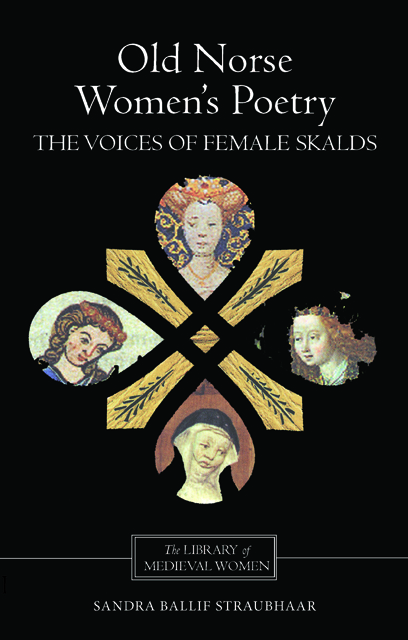Book contents
- Frontmatter
- Contents
- Foreword
- Abbreviations
- Introduction
- I. Real People, Real Poetry
- II. Quasi-Historical People and Poetry
- III. Visionary Women: Women’s Dream-Verse
- IV. Legendary Heroines
- V. Magic-Workers, Prophetesses, and Alien Maidens
- VI. Trollwomen
- Old Norse Literature Time Line
- Glossary of Personal Names
- Bibliography
- Index of Names
- Library of Medieval Women
IV. - Legendary Heroines
Published online by Cambridge University Press: 14 February 2023
- Frontmatter
- Contents
- Foreword
- Abbreviations
- Introduction
- I. Real People, Real Poetry
- II. Quasi-Historical People and Poetry
- III. Visionary Women: Women’s Dream-Verse
- IV. Legendary Heroines
- V. Magic-Workers, Prophetesses, and Alien Maidens
- VI. Trollwomen
- Old Norse Literature Time Line
- Glossary of Personal Names
- Bibliography
- Index of Names
- Library of Medieval Women
Summary
The three speaking poets in the following section come from the paradoxical world of the legendary sagas (fornaldarsögur) – written down relatively late (typically in the thirteenth or fourteenth century) in terms of saga-writing, but assembled from very early narrative material, going back to the time of the early tribal migrations in northern Europe (ca. 350–600). Historical events, locations and persons from the Migration Age appear in the fornaldarsögur in altered but recognizable form, with little importance given to historical chronology, just as they do in analogous narratives from other northern European literatures – e.g., Beowulf, although Beowulf is five or six centuries older than these sagas. These legendary sagas are exemplified by such stories as those of Sigurðr Fáfnisbani (Fáfnir’s Bane) and Brynhildr the Valkyrie; the Danish king Hrólfr kraki, who – like his Beowulfian analogue, Hroðgar – needs a foreign hero with a B-name to save his mead-hall from a monster; and Hervǫr Angantýsdóttir, the curse-daring shield-maiden, wielding her fated ancestral sword, Tyrfingr. References to actual events and persons sprinkled throughout the legendary sagas include the great battle between the Goths and the Huns in 451, and figures such as Attila the Hun and the Gothic chieftains Theodoric and Ermanaric.
Vǫlsunga saga, perhaps the most celebrated of these legendary sagas, tells the full version of Brynhildr the shield-maiden’s tragic story. The Eddic poem from the Codex Regius (but not found in the saga) that is included immediately below allows her an otherwise unprecedented opportunity to speak for herself, at some length.
Brynhildr and Gýgrin (the Trollwoman) in Helreið Brynhildar (Brynhildr’s Ride to Hel)
Codex Regius GKS 2365 4to, late thirteenth century Also in Nornagests þáttr, Flateyjarbók manuscript (FSNL I)
Neckel, Edda, rev. Kuhn, 219–221
Klaus von See et al., Kommentar, VI, 489–565
Riding to the Otherworld in the funerary wagon in which her body has lately been immolated, the legendary heroine Brynhildr defends the life she has lived
This poem displays some of the inconsistencies of the larger narrative complex in which it is embedded. Is Brynhildr an ordinary mortal woman who happens to frequent battlefields, has a famous brother (Atli, i.e. Attila), and falls foul of a family of vindictive royal Burgundians whose names start with G? Or is she an immortal valkyrie, and a lapsed favorite of the god Óðinn? Vǫlsunga saga can be read to support either interpretation.
- Type
- Chapter
- Information
- Old Norse Women's PoetryThe Voices of Female Skalds, pp. 49 - 70Publisher: Boydell & BrewerPrint publication year: 2011



